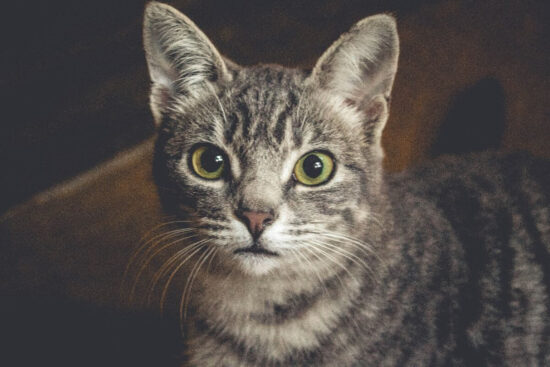When cat owners smell lavender, they often think about relaxation and calm feelings. But what happens when cats smell this popular purple flower? The answer might surprise you. While many people wonder if cats like lavender for its calming effects, the truth is more complicated and important for every cat owner to understand.
The big question isn’t just whether cats like or hate lavender. The real issue is about keeping cats safe. Understanding both the safety risks and how cats actually respond to lavender can help cat owners make better choices for their furry friends.
Why Lavender Can Be Dangerous for Cats
Before talking about whether cats hate lavender or enjoy it, cat owners need to know about safety first. Lavender contains natural chemicals called linalool and linalyl acetate. These compounds give lavender its sweet smell that humans love.
But here’s the problem: cats don’t have the right liver enzymes to break down these chemicals safely. When cats can’t process these substances properly, the chemicals can build up in their bodies and cause health problems.
The ASPCA officially lists lavender as toxic to cats. This means veterinarians and animal experts agree that lavender can harm cats, even if it seems harmless to humans.
Different Types of Lavender Products Have Different Risks
Not all lavender products are equally dangerous, but they all carry some risk. Fresh lavender plants are mildly toxic if cats eat them, usually causing stomach upset. Most cats won’t eat enough of the plant to cause serious problems, but some stomach irritation can happen.
Lavender essential oils are the most dangerous form because they’re highly concentrated. These oils contain much higher levels of the toxic compounds than fresh plants. When lavender oil goes through a diffuser, cats can breathe in the oil droplets or get them on their fur. Even though the oil is mixed with water, it can still cause breathing problems or skin irritation.
Products like candles, sprays, or cleaning products with lavender have varying amounts of the plant’s compounds. While usually less concentrated than pure essential oils, they can still pose risks to sensitive cats.
What Health Problems Can Lavender Cause in Cats?
When cats are exposed to lavender, several symptoms can appear. Cat owners should watch for these warning signs:
Stomach problems often show up first. Cats might vomit, have diarrhea, or stop wanting to eat. These symptoms often appear within the first few hours after exposure.
Breathing issues are particularly concerning. Cats might have trouble breathing, cough, or wheeze when they inhale lavender oil droplets. This is especially dangerous for cats with asthma or other breathing problems.
Some cats develop nervous system effects. They might become depressed, disoriented, or develop tremors. These cats might seem confused or have trouble walking normally.
Direct contact with lavender oil can cause skin irritation. The oil can cause redness, itching, or burning sensations if it touches a cat’s skin.
If cat owners notice any of these symptoms, they should contact their veterinarian right away. Quick treatment can prevent more serious health problems.
Do Most Cats Hate Lavender?
Now for the behavioral question: how do cats actually respond to lavender scent? The research shows that cats hate lavender much more often than they enjoy it.
Cats have a sense of smell that’s 14 times stronger than humans. This means scents that smell pleasant to people can be overwhelming and unpleasant for cats. Lavender’s strong fragrance often falls into this category.
Most cats generally dislike the strong, pungent smell of lavender. They often show this dislike by moving away from lavender plants, avoiding areas where lavender products are used, or showing signs of stress when exposed to the scent.
Why Cats Hate Lavender So Much
There are several reasons why cats hate lavender more than they like it. Lavender belongs to the mint family, which includes other plants that cats typically avoid. This family of plants naturally repels many animals, including cats.
Because cats smell things so much more strongly than humans, lavender can create sensory overload. What smells nice to people might smell overpowering to cats. Cats may instinctively avoid strong scents that could signal danger. In the wild, strong plant smells often mean the plant could be toxic.
The scent of lavender can activate stress pathways in a cat’s brain, causing discomfort rather than relaxation. This is the opposite of what most people expect from this supposedly calming plant.
But Some Cats Like Lavender: Understanding Individual Differences
While most cats hate lavender, some cats like lavender or at least don’t seem bothered by it. Individual cats can have different responses to the same scent. This variation happens because of several factors.
Research shows that cats have genetic variations that affect how they respond to different scents and experiences. Some cats might be naturally less sensitive to lavender’s compounds. Cats that were exposed to certain scents during their kitten years might have different reactions as adults. A cat that grew up around lavender might be more tolerant of it.
Studies show cats have individual personality traits that affect how they respond to new experiences. Some cats are naturally more curious or less reactive to strong scents. Cats with different health conditions or stress levels might react differently to lavender. A very stressed cat might be more sensitive to overwhelming scents.
How to Tell if Your Cat Hates Lavender
Cat owners can watch for specific signs to see if their cats hate lavender. Cats that dislike lavender will often leave the room when they smell it, or they might avoid areas where lavender products are used.
Physical signs of stress are important to notice. Watch for signs like excessive grooming, hiding, seeking high places, or changes in eating habits. If cats start breathing with their mouth open, breathing faster, or making any unusual breathing sounds, this could mean the lavender is bothering them.
Behavioral changes can also signal problems. Cats might become more aggressive, more withdrawn, or show other personality changes when exposed to scents they don’t like.
The Problem with Lavender Diffusers
Many cat owners ask about using lavender essential oil diffusers in their homes. Even if some cats like lavender scent, diffusers create special risks that all cat owners should understand.
Essential oil diffusers release tiny droplets of oil into the air that cats can breathe in or that can land on their fur. When cats groom themselves, they might lick these oil droplets off their fur and accidentally eat them.
Even cats with no obvious reaction to lavender can develop breathing problems from diffused oils. The oils can irritate the lining of their respiratory system and cause inflammation in their lungs.
Veterinary experts have noticed more cases of essential oil poisoning in recent years as diffusers become more popular. This trend worries animal health professionals.
Why “Cat Safe” Lavender Products Aren’t Really Safe
Some companies sell products labeled as “safe for cats” that contain lavender. However, veterinary professionals and animal safety organizations generally recommend avoiding all lavender products around cats.
The problem is that there’s no established “safe” amount of lavender for cats. Each cat’s sensitivity is different, and even small amounts can cause reactions in some cats.
Better Alternatives for Calming Cats
Since most cats hate lavender and it can be dangerous, cat owners should look for safer ways to help their cats feel calm and relaxed.
Proven Cat Safe Options
Products like Feliway use synthetic versions of natural cat pheromones to create feelings of safety and calm. These work with cats’ natural biology without any toxic risks.
Catnip, silver vine, and valerian root can help cats relax naturally. About 80% of cats respond positively to silver vine, even if they don’t react to catnip. Sometimes the most calming thing for cats is predictability through regular feeding times, daily play sessions, and consistent routines.
Herbs like chamomile and passionflower can be used safely around cats in dried form or in specially formulated cat products.
Creating a Stress Free Environment
Instead of relying on scents, cat owners can help their cats feel calm through environmental changes. Cats feel safer when they have places to retreat and observe their surroundings. Cat trees, shelves, and high perches help cats feel secure and in control of their territory.
Cats are very sensitive to dirty litter boxes, which can cause stress and inappropriate elimination. Interactive play helps cats burn energy and reduce anxiety naturally.
What to Do if Your Cat Gets Exposed to Lavender
Accidents happen, and cats might come into contact with lavender despite precautions. Here’s what cat owners should do immediately:
Get the cat away from the lavender product immediately and put the cat in a well ventilated area. Watch for breathing problems, drooling, vomiting, or unusual behavior. If lavender oil got on the cat’s skin or fur, wash it off immediately with mild soap and water.
Even if the cat seems fine, call the vet to report the exposure and get professional advice. The sooner treatment starts, the better the outcome for cats with essential oil exposure.
Making Smart Choices for Your Cat’s Health
Understanding that most cats hate lavender and that it can be harmful helps cat owners make better decisions. While some cats like lavender or seem unaffected by it, the potential risks outweigh any possible benefits.
Cat owners who want to use lavender in their homes should keep it completely away from their cats. This means using lavender products only in rooms where cats don’t go and storing all lavender items securely.
For cats that seem stressed or anxious, working with a veterinarian to find safe, effective solutions is always the best approach. Many proven alternatives can help cats feel calm without putting their health at risk.
The bottom line is simple: when it comes to cats and lavender, safety should always come first. Whether cats hate lavender or cats like lavender in individual cases, the toxic nature of the plant makes it a poor choice for households with feline family members.
By choosing cat safe alternatives and focusing on environmental enrichment, cat owners can help their pets feel relaxed and happy without any unnecessary health risks. A calm, healthy cat is always worth more than any pleasant scent in the home.


